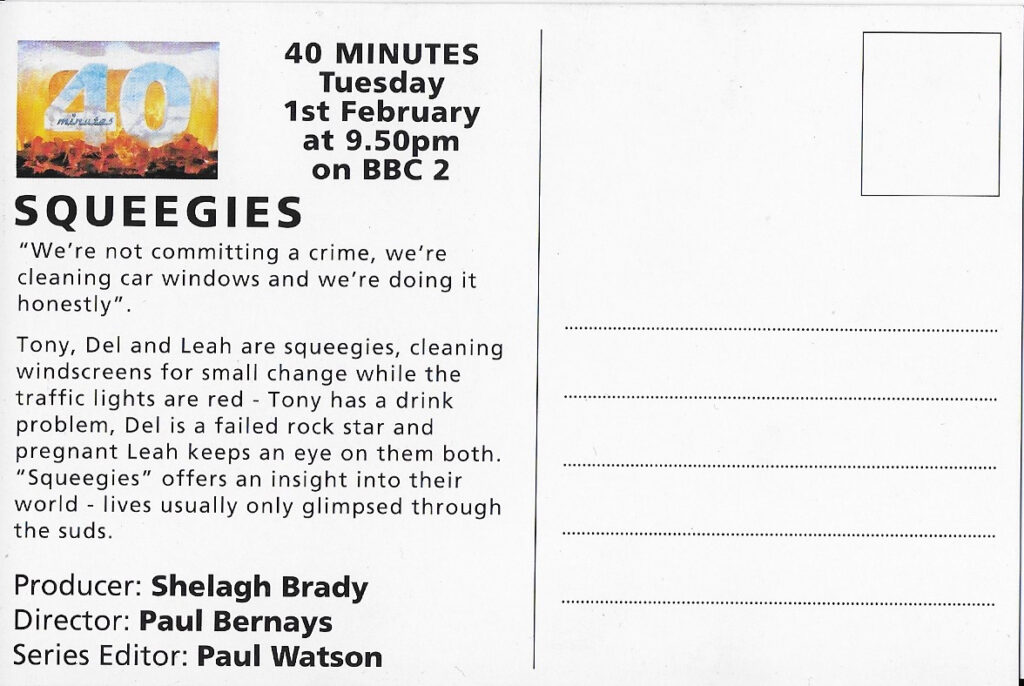Film maker PAUL BERNAYS tells Vauxhall History about his documentary film ‘Squeegies’, made for BBC2’s 40 Minutes documentary series, which showed a year in the life of the now long-gone crews who lay in wait at traffic lights and cleaned car windscreens in the hope of a tip
In the summer of 1992 ‘squeegies’ – people washing car windows at the lights for small change – began to appear on my home turf in Vauxhall. It was a sign of the times. There was a biting recession; social security had been shrunk. Squeegies had spread across London, part of a growing underclass scurrying between cars, living, literally, at the margins of mainstream society. Someone said it was ‘almost Dickensian’. I’d lose the ‘almost’.
I wondered who were these people that, in the minute or so when the lights were red, got at best small change, more often nothing and sometimes a curse or an actual kicking. The Standard declaimed ‘Gangs of windscreen wash bandits who earn £1k a week’. Double that for today’s money but anyway it was a deliberately vilifying lie, which spread. The Times called them the ‘modern highwaymen’ of a ‘vagrant culture’, although in true Tory spirit admitted it showed ‘entrepreneurial resourcefulness on the part of the young unemployed’.
I went up and spoke with our local squeegies. Three I clicked with, our conversations carrying on in the middle of the road and over cups of tea. Leah, nicknamed the Queen Bee of the Crosses (Vauxhall Cross that is), was warm, open-hearted, and pregnant. She also had to be tough, like when it fell to her to say who could work which sets of lights, as it always seemed to. Del cleaned windscreens like a consummate showman, never leaving a driver without a smile but carrying a saddening story of life in care homes and disillusioned ambition not far below his glistening brave face. They both took young Tony, prematurely battered by life, circumstance and alcohol, under their wing. The trio were open to the idea of being filmed so we hung out. Some days I went and didn’t film at all.
I shot the film on a small Hi8 video camera, which had only just come on the market and had not been used for television before. It allowed me to film unobtrusively while my friend Sam pointed the microphone. A whole film crew alters any situation they go into. I was fresh out of a film course at the London College of Printing (now the London College of Communication) at the Elephant and Castle, so this helped me develop my observational and conversational documentary style. Some of the individual shots lasted a long time as conversations developed; really, as a documentary maker, sometimes you just have to listen to what people say. The result is that viewers got to spend quality time with Leah, Del and Tony, listening to them chat, joke and confide in me as they dodged moving cars. The viewers were entering a world they wouldn’t otherwise know.
I took some footage to the BBC, and was given a slot in the final run of the great documentary series 40 Minutes. When a caption says ‘One year later’ that’s the time it took to close the meagre deal. Paul Watson, the maverick BBC commissioner who took it, told me he was driving a visiting American network producer to a meeting in London, waxing lyrical to him about how his 40 Minutes series was ‘taking the temperature of modern Britain’, when they passed through Vauxhall Cross, Watson exclaiming ‘We’re even making a film right here!’.

Just before it was broadcast, BBC2 management went ballistic about the swearing, so our days of tough negotiations ended with me forced to muffle all the F words. I won the concession of loudly bleeping the C words so you at least know something strong has been said. Fill them in yourself.
More broadly I hope you find empathy and spark in this slice of Vauxhall life past. The film shows Leah becoming a parent, making hope for the future. That future is now present and the underclass ever swelling.
Squeegies was broadcast on 1 February 1994 on BBC2.

